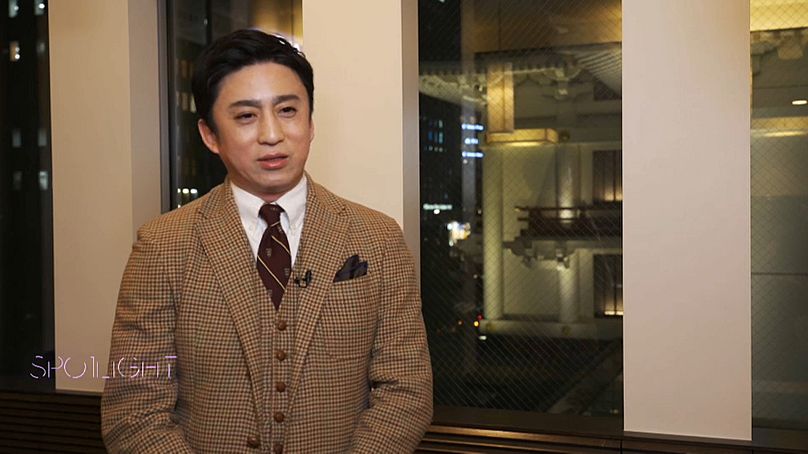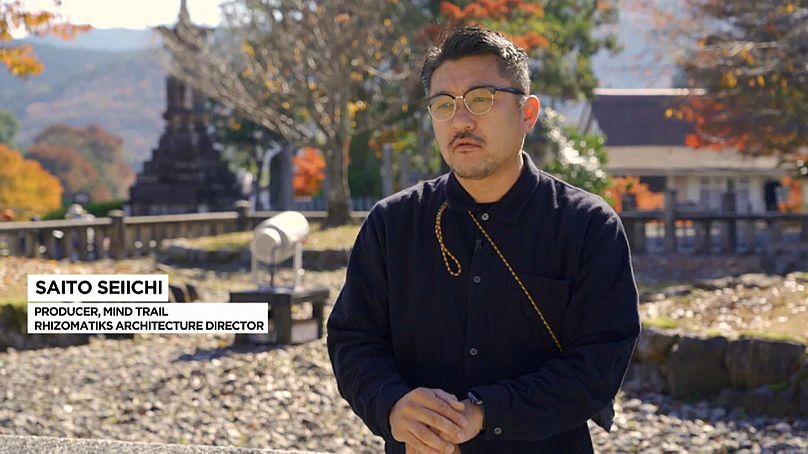We take a look at the ways Japan is getting its traditional theatre performances known as Kabuki out to audiences during the pandemic. Then we go for a stroll to an open-air art festival specially adapted to COVID times.
The entertainment industry has been negatively impacted by the pandemic. Theatres have seen their box office profits plummet overnight, as venues close to try to stop the spread of the virus. But the show must go on. Access to culture cannot be stopped. That's why some artists have looked for new ways to continue to perform.
Traditional Kabuki
In Japan, Kabuki is an all-male, popular theatre form that combines the best of Japanese music, dance, drama and costumes. Its history goes back over 400 years. It even became part of UNESCO’s Intangible Cultural Heritage of Humanity back in 2008.
In the vibrant district of Ginza in Tokyo sits the famous Kabukiza theatre. It recently re-opened its doors with new measures to keep the public safe and it is here that people come to enjoy Kabuki shows.
But the traditional art form was recently given a modern make-over by one of its best-known actor's, Matsumoto Koshiro. The closure of the theatre prompted him to make his long-held wish of creating a new type of online kabuki performance come true. The result is what he calls “Zoom-Kabuki” or “Dream Kabuki”.
In a world-first, in June 2020, the actor and director was able to stream the 11 acts of one of the most important Kabuki plays, “Chu-shin-gura”, in online instalments. In order to give audiences one of the most authentic and sensory experiences, Matsumoto Koshiro was able, on occasions, to mix pre-recorded and live performances so he could play different roles simultaneously on screen. The result is just like being in the theatre.
Matsumoto Koshiro also produced a comedy called Yaji Kita. It's based on a popular travel literature series from the 19th century. It was pre-recorded and shown in December.
We met with Matsumoto Koshiro to get his take on how the pandemic has affected the artform. He says that theatres were closed for a long time and that he felt strongly that Kabuki might disappear. But according to Matsumoto Koshiro , "internet broadcasting is a contemporary solution." It also provides actors with a way to stay in shape, as "Kabuki actors used to be on stage about 10 months a year. They could maintain artistic skills by continuing to go on stage, including their physical condition."
Online performances have pleased Kabuki actors and Matsumoto Koshiro feels that "even if the stage reopens normally in the future, our will is to continue Zoom Kabuki forever".
An outside art festival
500 kilometres away from bustling Tokyo, Nara prefecture is home to dozens of World Heritage sites. Its main city was the capital of Japan during the 8th century. It's an area of outstanding beauty, so naturally, it was the perfect backdrop for a new type of art festival created in response to the COVID-19 pandemic.
In Autumn 2020, visitors were able to discover an open-air pop-up gallery called 'Mind Trail' which wasspread across three different sites in the prefecture of Nara. In the small town of Yoshino in the Kii Mountains, a selection of contemporary artwork was available to enjoy, safely and at your own pace.
Some of the visitors came for the sport and nature as well as the art because the trail is 5-8 kilometres long. Saito Seiichi, the Rhizomatiks Architecture Director and producer of 'Mind Trail' says what people realised is "that nature itself is actually the art piece".
His specific work for the festival is called 'Axis'. He describes it as "redefining the axis of the village and also the axis of the shrine.”
For the featured artists in Mindtrail, it was a unique platform to reconnect with the public and to express their feelings about the pandemic.
They say art has the power to heal. At a time when this is much needed, Japan is supporting its culture industry by thinking outside the box.













